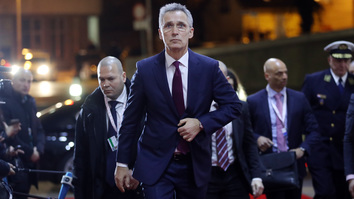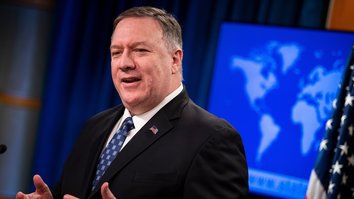KABUL -- The United States and the Taliban are set to sign a historic agreement that would pave the way to ending America's longest war, both sides announced Friday (February 21), hours after Kabul said a week-long partial truce across Afghanistan would kick off Saturday.
If that so-called "reduction in violence" holds, it would mark a major turning point in the gruelling conflict and set the conditions for a deal that could, ultimately, pull US troops out after more than 18 years.
Both US Secretary of State Mike Pompeo and the Taliban issued statements saying they had agreed to sign the accord on February 29 in Doha, following the one-week partial truce.
"The United States and the Taliban have been engaged in extensive talks to facilitate a political settlement to end the war in Afghanistan, reduce United States and Allied Forces presence, and ensure that no terrorist group ever uses Afghan soil to threaten the United States or our allies," Pompeo said in a statement Friday.
![President Ashraf Ghani meets with US Special Representative for Afghanistan Reconciliation Zalmay Khalilzad, US Chargé d'Affaires Ross Wilson and the commander of US and NATO forces in Afghanistan, Gen. Scott Miller, at the Presidential Palace February 21 to discuss the planned week of reduction in violence. [Afghan Presidential Palace]](/cnmi_st/images/2020/02/21/22595-pak1-585_329.jpg)
President Ashraf Ghani meets with US Special Representative for Afghanistan Reconciliation Zalmay Khalilzad, US Chargé d'Affaires Ross Wilson and the commander of US and NATO forces in Afghanistan, Gen. Scott Miller, at the Presidential Palace February 21 to discuss the planned week of reduction in violence. [Afghan Presidential Palace]
"Upon a successful implementation of this understanding, signing of the US-Taliban agreement is expected to move forward," Pompeo said, adding negotiations between the Taliban and the Afghan government would "start soon thereafter".
The "reduction in violence" among US, Taliban and Afghan security forces will begin Saturday (February 22), Afghan National Security Council spokesman Javid Faisal and Taliban sources said earlier.
NATO chief Jens Stoltenberg welcomed the announcement that an understanding has been reached on a significant reduction in violence across Afghanistan.
"This is a critical test of the Taliban's willingness and ability to reduce violence, and contribute to peace in good faith," he said in a statement.
"This could pave the way for negotiations among Afghans, sustainable peace, and ensuring the country is never again a safe haven for terrorists," Stoltenberg said.
"NATO remains committed to Afghanistan's long-term security and stability," he added.
The United States has been in talks with the Taliban for more than a year to secure a deal in which it would pull out thousands of troops in return for Taliban security guarantees and a promise to hold peace talks with the government in Kabul.
A reduction in violence would show the Taliban can control their forces and demonstrate good faith ahead of any signing.
In a statement, the Taliban said warring parties would "create a suitable security situation" ahead of a deal signing.
One Taliban source in Pakistan said that if an agreement is signed on February 29, talks between the Taliban and the Afghan government, needed to cement a broader peace deal, are slated to start March 10.
Stand down
In Kandahar Province, which is seen as the Taliban's heartland, one insurgent told AFP he had received orders to stand down.
However, another Taliban commander based in Kandahar, Hafiz Saeed Hedayat, said he had been ordered to refrain only from attacking major cities and highways.
"This means maybe the violence will continue in the districts," Hedayat said.
The reduction in violence is "still just the first step to get to intra-Afghan negotiations", Andrew Watkins, a senior analyst with the International Crisis Group, told AFP.
"Those talks will be a tough road of their own but are the best avenue to peaceful settlement to Afghanistan's conflict."
On Thursday (February 20), the deputy leader of the Taliban said the insurgents are "fully committed" to a deal with Washington.
"That we stuck with such turbulent talks with the enemy we have fought bitterly for two decades, even as death rained from the sky, testifies to our commitment to ending the hostilities and bringing peace to our country," Sirajuddin Haqqani wrote in an opinion piece in the New York Times.
Haqqani is also head of the Haqqani Network, a United States-designated terror group that is one of the most dangerous factions fighting Afghan and United States-led NATO forces in Afghanistan.

![In this file photo taken on August 27, 2017, US Marines and Afghan commandos stand together as an Afghan Air Force helicopter flies past during a combat training exercise in Helmand Province. [Wakil Kohsar/AFP]](/cnmi_st/images/2020/02/21/22593-000_1oz35p-585_329.jpg)







If there is a nationwide peace in Afghanistan, all people need peace. We will also be happy if the home burning war ends in our country.
Reply1 Comment